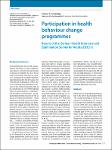Participation in health behaviour change programmes
Results of the German Health Interview and Examination Survey for Adults (DEGS1)
Jordan, Susanne
Lippe, Elena von der
Health behaviour change programmes to promote healthy behaviours are aimed at, among other things, counteracting the emergence of widespread non-communicable diseases. Which population groups use these programmes? This analysis is based on data from DEGS1, which was conducted from 2008–2011. People aged 18–79 years were asked about their participation in programmes in the last 12 months in the fields of nutrition, physical activity and relaxation (n=7,807). The analysis was stratified by sex, age, socioeconomic status (SES), and type of statutory health insurance fund. A total of 16.6% of respondents participate in at least one programme for behaviour change, with women using these programmes significantly more frequently, indeed twice as often, as men (22.1% versus 11%). The older population participates more often than younger age groups. Women and men with low SES use the programmes significantly less frequently than those with middle or high SES. Women who are insured by the AOK health insurance group have a significantly lower rate of participation than women insured by any other statutory health insurance fund. Overall participation has almost doubled since the “German National Health Interview and Examination Survey 1998” (9.1%). Further efforts are necessary to reach population groups with low participation rates.
No license information

